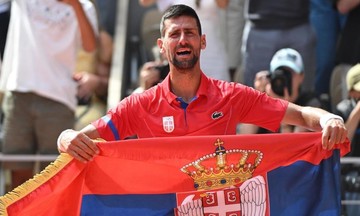During the women's quad sepak takraw world championship final on 27/7, Vietnamese and Thai players often turned towards their opponents and celebrated after scoring. Some shouted and pointed to the sky, others stuck out their tongues, or raised their fists. This can be considered a characteristic of sepak takraw, which most other sports do not have.
 |
Tran Thi Ngoc Yen, Nguyen Thi Yen, and Nguyen Thi My (from left to right) celebrate after scoring a point against Thailand in the women's quad sepak takraw world championship final at Central Hatyai shopping center, Songkhla province, Thailand, on 27/7/2025. Photo: Sanamtakraw
According to former Vietnamese women's team striker Bui Thi Hai Yen, sepak takraw is tense and demanding. Players often react strongly after scoring, such as running to the net and shouting, simply as a way to celebrate and release pressure. "These actions also demonstrate a competitive spirit and put pressure on the opponent," Hai Yen told VnExpress.
Hai Yen played prominently at the 2018 Asian Games in Palembang, Indonesia, contributing to Vietnam's bronze medal in the women's team event. She understands that outsiders might view these actions as mocking or disrespectful. "But for us, this has been a characteristic of sepak takraw since the beginning, adding excitement and emotion to the game," she added.
Hai Yen has been playing sepak takraw since she was a child and has participated in two Asian Games. She said that celebrating this way has become instinctive for her, her teammates, and her opponents. "Sepak takraw is not just a game of physical strength and skill, it's also a mental test," she emphasized. "Some players feel pressured by this, leading to poor performance. But others use it as motivation to play better."
 |
Thai players celebrate in front of the Vietnamese team. Screenshot
Sepak takraw's name combines "sepak," meaning "kick" in Malay, and "takraw," meaning "woven ball" in Thai. The name was agreed upon after a meeting between Malaysian and Thai representatives in Kuala Lumpur in 1960.
The origins of sepak takraw remain debated, with possible roots in China, Myanmar, Thailand, or Malaysia. However, the modern sport was established by Thailand and Malaysia and first included in the 3rd SEA Games in Kuala Lumpur in 1965. It represents the region's culture, untouched by Western influence.
The topic of celebrations in sepak takraw is often discussed on Pantip, a major online forum in Thailand. User Salted Egg's widely-supported explanation states: "This is very normal in sepak takraw. In the past, players cheered, teased, and taunted each other even more than now, but there were no fights. We shouldn't let Western biases affect sepak takraw's cultural aspects."
User 2130937 commented: "Sepak takraw is still a regional sport, not yet globally popular. To become international, the rules and etiquette must be adjusted. Those who follow sepak takraw will find such celebrations normal. Those who follow international sports might find it unpleasant."
Highlights of the 2025 Sepak Takraw World Championship women's quad final.
Such celebrations could result in warnings in volleyball or brawls in soccer. In non-contact sports like tennis, table tennis, or badminton, players rarely celebrate in this manner.
Vietnamese women's sepak takraw team coach Tran Thi Vui explained that these celebrations are not meant to mock opponents. While the rules don't prohibit such celebrations, there are limits. "Players are not allowed to point at their opponents' faces, only to gesture like, 'Not today, friend'," Vui told VnExpress. "If they go too far, the referee will issue a warning and a penalty card."
Vui recounted a match against Myanmar in the group stage where, after scoring, an opponent turned to the Vietnamese team and pointed at their heads, as if to say, "I'm so smart." The referee immediately issued a warning. "The player then turned to me and the Vietnamese team and apologized," the 47-year-old coach said.
Xuan Binh












